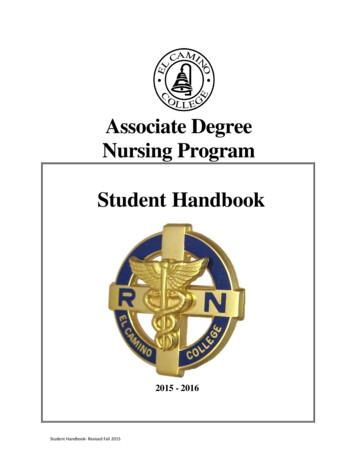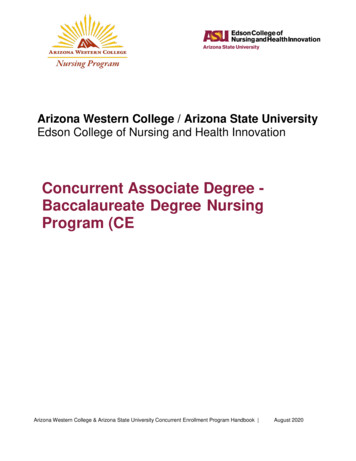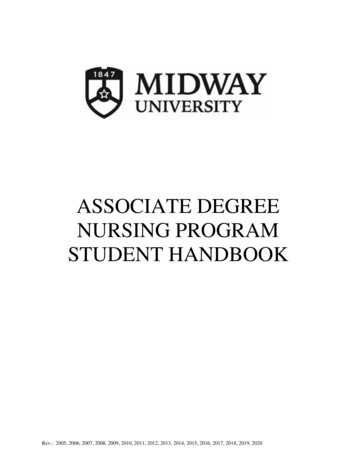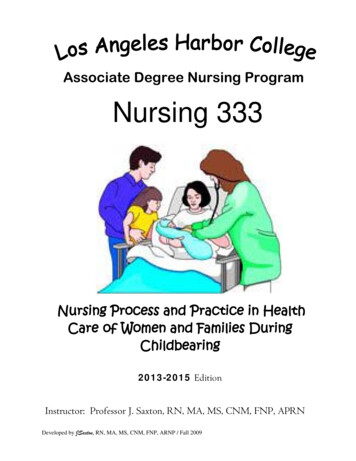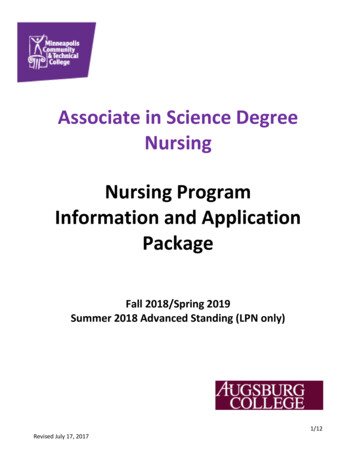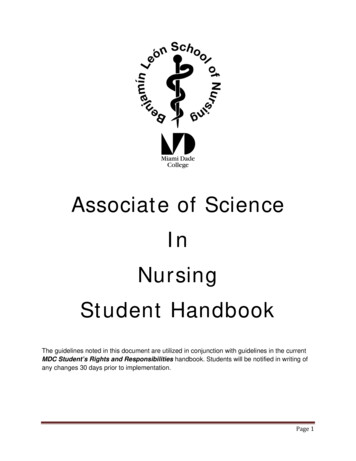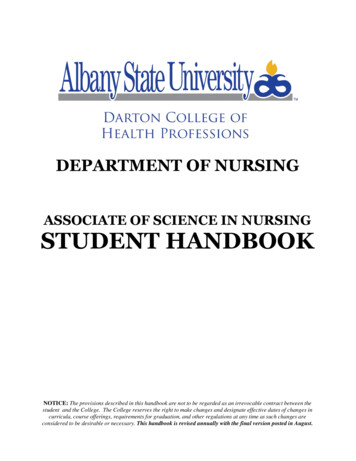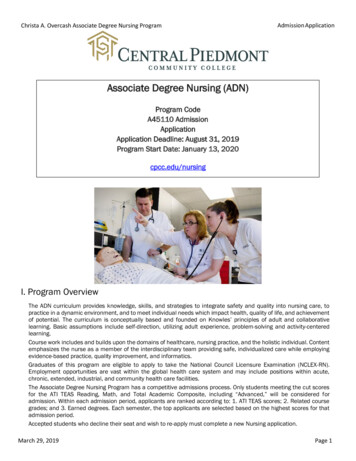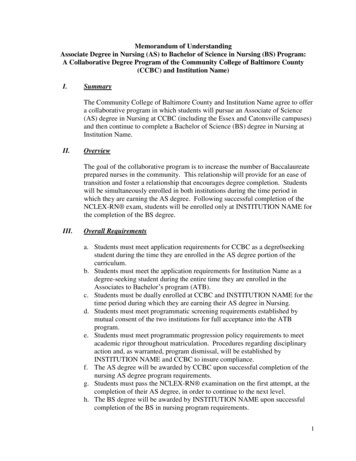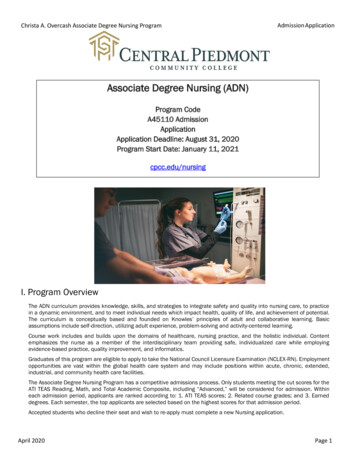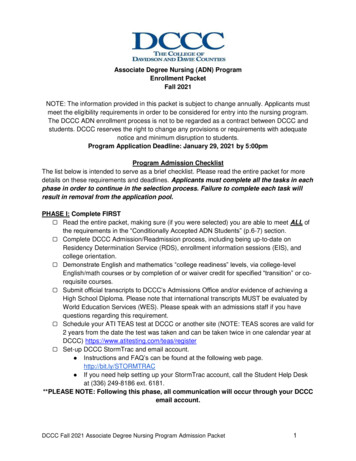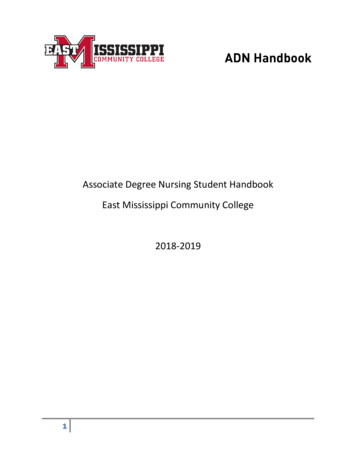
Transcription
Associate Degree Nursing Student HandbookEast Mississippi Community College2018-20191
East Mississippi Community College is committed to assuring that the College and its programs are free fromdiscrimination and harassment based upon race, color, ethnicity, sex, pregnancy, religion, national origin,disability, age, sexual orientation, gender identity, genetic information, status as a U.S. veteran, or any other statusprotected by state or federal lawThe following people have been designated to handle inquiries regarding the non-discrimination policies:Office of the Director of Human Resources, Payroll and EEOC/OCR1512 Kemper StreetScooba, Mississippi 39358(662) 476-5274Office of the Campus Director and Dean of Students Golden Triangle CampusDisability Services Coordinator8731 South Frontage RoadMayhew, MS 39753(662) 243-1979Office of the Vice President for Student LifeTitle IX Coordinator1512 Kemper StreetScooba, Mississippi 39358(662) 476-5274EMCC is in compliance with the Student Right to Know and Campus Security Act (Public Law 101-542), the CampusSaVE Act, and the Higher Education Technical Amendments of 1991 (Public Law 102-26).EMCC agrees to comply with The Principles of Accreditation: Foundations for Quality Enhancement and all relatedstipulations of the Southern Association of Colleges and Schools Commission on Colleges.NOTICEEast Mississippi Community College reserves the right to add, delete or modify policies and procedures stated hereinas determined necessary for the proper functioning and orderly operation of the institution.2
TABLE OF CONTENTSCONTENTPAGEWELCOME6HISTORY8STATEMENT OF PURPOSE AND MISSION OF THE COLLEGE8EXPECTIONS OF THE COLLEGE9DISTANCE LEARNING MISSION STATEMENT9ADN MISSION STATEMENT & PHILOSOPHY9-11CONCEPTUAL FRAMEWORK12PROGRAM OF STUDY14END OF PROGRAM COMPETENCIES16-19PROGRAM OUTCOMES17STUDENT ACTIVITIES18STUDENT PARTICIPATION IN GOVERNANCE19GENERAL POLICIESHEALTH19INFECTION CONTROL203
COMPROMISED IMMUNE SYSTEM21PREGNANT STUDENTS22CRIMINAL BACKGROUND CHECK22DRUG SCREEN24CARDIOPULMONARY RESUSCITATION24HEALTH INSURANCE24LIABILITY INSURANCE25CONFIDENTIALITY25TECHNOLOGY USE25TRAVEL AND TRANSPORTATION26SOCIAL MEDIA26EXAMINATION POLICY27STUDENT ADVISING31ACADEMIC CONFERENCE FORM33GRADES AND GRADING SCALE34PROMOTION, RETENTION AND READMISSION35GRADUATION REQUIREMENTS35READMISSION POLICY36ATTENDANCE394
ATI TESTING41SKILLS VALIDATION48UNIFORM/DRESS CODE48CLASSROOM COMPLAINTS50VERIFICATION OF RECEIPT OF HANDBOOK52VERIFICATION OF RECEIPT OF COLLEGE52CATALOG AND EMCC STUDENT HANDBOOK535
WELCOMEWelcome to East Mississippi Community College. East Mississippi Community College (EMCC) isaccredited by the Southern Association of Colleges and Schools Commission on Colleges toaward certificates and the associate degree. Contact the Commission on Colleges at 1866Southern Lane, Decatur, Georgia, 30033-4097 or call (404) 679-4500 for questions about theaccreditation of EMCC. The Commission is only to be contacted if there is evidence thatappears to support an institution's significant non-compliance with a requirement or standard.All normal inquiries about the institution, such as admission requirements, financial aid,educational programs, and other college related information should be addressed directly tothe College and NOT to the office of the Commission on Colleges.This program is accredited by the Mississippi Board of Trustees of State Institutions of HigherLearning. IHL contact information: Address, 3825 Ridgewood Road Jackson, MS 39211:telephone, (601) 432-6198, fax, (601) 432-6972, website, http://www.ihl.state.ms.us.This nursing education unit is accredited by the Accreditation Commission for Education inNursing (ACEN). Information about the Accreditation of EMCC's Associate Degree Nursingprogram with ACEN can be obtained from their website http://www.acenursing.org/, byemailing Marsal P. Stoll, EdD, Chief Executive Officer of ACEN at mstoll@acenursing.org or bywriting to Accreditation Commission for Education in Nursing, 3343 Peachtree Road NE, Suite850, Atlanta, GA 30326. Graduates of the program receive the Associate of Applied Science inNursing Degree which meets the educational requirement needed to apply for the NationalCouncil of State Boards of Nursing licensure examination for the Registered Nurse (NCLEX-RN ).The purpose of the program is to prepare men and women for the role of the registered nurse,competent to function as a beginning professional and valuable member of the health careteam in providing care for individuals, families, and communities.Successful completion of the nursing program does not guarantee eligibility to sit for theNCLEX-RN or application for licensure. The Board of Nursing will conduct a criminalbackground check on each student (at the student’s expense) prior to graduation and may, at6
its discretion, deny any application to sit for exam or application for licensure due to, but notlimited to, conviction of a felony, commission of fraud or deceit in the application process oraddiction to alcohol or other drugs. Please see the National Council of State Boards of Nursingwebsite, www.ncsbn.org, for more information.Criminal background checks for students are valid for two years, as long as the student iscontinuously attending the program. If the student is not continuously enrolled in the ADNprogram, a new “clear” background check will be required prior to readmission. Please see theNational Council of State Boards of Nursing website, www.ncsbn.org, for more information.As your faculty we are here to help you meet your goal. If we can be of any assistance to you,please do not hesitate to let us know. We have prepared this handbook to help you along yourjourney. In it you will find the nursing curriculum, policies and guidelines that are specific to thisprogram only. Please refer to the EMCC student handbook for general college policies.Again, welcome to EMCC. Please familiarize yourself with this handbook as well as the collegecatalog/handbook as you are held responsible for its contents.Sincerely,Nursing Faculty7
HISTORY OF THE ASSOCIATE DEGREE NURSING PROGRAMAugust 2, 1981 East Mississippi Community College graduated its first class of Associate DegreeRN students. The graduating class had a 100% rate on the NCLEX-RN . Although the first classwas very successful, it was decided that the program could not be offered the next year.In 2005, college administration and members of various health and community agencies in theGolden Triangle area identified a need for more registered nurses in the entire state ofMississippi. In October 2008, the Mississippi Institutes of Higher Learning (IHL) granted approvalto establish an Associate Degree Program in Nursing at East Mississippi Community College.Initial accreditation and permission to admit students was granted by IHL in October 2009.In April of 2012 this nursing education received full accreditation by the National League forNursing Accrediting Commission (now ACEN).THE MISSION OF EAST MISSISSIPPI COMMUNITY COLLEGEEast Mississippi Community College is a public community college serving six counties in EastCentral Mississippi, offering university-parallel programs, career-technical programs, andworkforce programs. EMCC is dedicated to improving the quality of life for our students, ourcommunity, and our personnel through instructional opportunities, with specific focus on ahealthy mind, body, and spirit.VALUES1. Leadership built on respect for self and others and demonstrated in our local communities2. Excellence in education, service and lifelong learning8
3. Access to instructional opportunities on campus and online4. Freedom in teaching and learning within a supportive, communicative, diverse, and caringEnvironmentEXPECTATIONS OF THE COLLEGEStudents at East Mississippi Community College who have specialized in an academic area andwho have received an associate degree should be prepared to meet the requirements forcontinuing academic work. Similarly, those students who graduate with an associate of artsdegree or are certified in technical or career training areas should be prepared to succeed inemployment opportunities in their field of preparation.Any person reached by the College through participation in instructional, cultural, or workforceservices should be aided in achieving the best quality of life possible. This development of theindividual will lead to district citizenry being well prepared to meet the needs and challenges ofthe region, the nation, and the world.DISTANCE LEARNING MISSION STATEMENTEast Mississippi Community College seeks to provide distance learning opportunities for itsdistrict’s constituents who are unable, for a variety of reasons, to attend classes on one of theCollege’s campuses. The distance learning opportunities meet all quality standards set forth fortraditional on campus classes to carry out the mission of the College.ADN MISSION STATEMENTThe faculty of the Department of Nursing upholds the mission and values of East MississippiCommunity College by supporting the educational and lifelong learning needs of our students9
and community. The faculty is dedicated to providing excellence in nursing education andevidence based practice, and incorporating innovations aimed at improving quality of life,development of individuals, and service to the community. Additionally, the faculty will seek toinstill the values of: the dignity and worth of people, respect for self and others, Acceptance ofcultural and ethnic differences, and civic mindedness. The school of nursing provides qualityeducation which prepares the graduate for entry-level practice of nursing, for lifelong learningand for future leadership roles.ADN PHILOSOPHYThe Faculty of the EMCC Associate Degree Nursing program holds certain values and beliefsabout nursing and nursing education. The Program philosophy was written by the faculty and isa reflection of their beliefs regarding the four foundational concepts of person, society, health,and nursing. These beliefs and values form the framework in which learning activities move in alogical progression from simple to complex.The faculty of the Department of Associate Degree Nursing believes that:PersonThe person is an individual, family or community. Although unique, each person sharescommon needs in relation to biological, psychological, sociocultural, and spiritual processesthroughout the lifespan. Each person has inherent worth and responsibility to fulfill their ownpotential. The person has the right to access to health care and to participate in decisionsrelated to their health care. The person is holistic; alterations in one aspect of a person’s lifeaffect the person as a whole.10
SocietySociety is composed of communities, families, and individuals. Society influences humanresponses to actual and potential health problems. Society responds to and adapts to changesin the environment.HealthHealth is the highest level of physiological, psychological, sociocultural, and spiritual functionthe person is capable of achieving. Health is a dynamic state of being resulting from theadaptation to the interaction of person and environment.NursingNursing is an art, a science, and a profession. Nursing has a scientific body of knowledge that isuniquely nursing. Nursing is focused on assisting individuals, families, and communities to reachtheir optimal level of functioning.Nursing education is most appropriately based in an institute of higher learning. It is acontinuous and dynamic process that is shared by students and faculty. Nursing educationfacilitates the learning of critical thinking, clinical reasoning, and problem solving skills. Clinicalexperiences are an essential component of all nursing classes. Although the responsibility forlearning lies solely with the learner, the educator is responsible for creating an atmosphere thatfosters learning. The educator must incorporate diverse teaching styles and strategies in theclassroom and clinical setting to meet the individualized needs of the learner. The facultystrives to provide a learning environment that both supports and challenges the student using avariety of instructional techniques and to instill the value of lifelong learning, to assure thatpractice is continually evidence based. Associate Degree Nursing education should build afoundation for the novice nurse to continue to the level of expert.11
CONCEPTUAL FRAMEWORKThe conceptual framework is an extension of the mission and philosophy of the ADNdepartment. It provides the blueprint for sequencing the curriculum. The curriculum is basedon the framework developed from beliefs about the concepts of person, society, health, andnursing. These concepts are woven together with the threads to create an organizedfoundation for the program, guiding decision making on curriculum, content, learningopportunities, and teaching/learning strategies.Threads are interwoven throughout the framework in order to determine the progression ofcontent from the simple to the complex, from dependent to independent, and from teacher ledto student directed learning. The threads are:1.Nursing Process is a scientific problem solving approach to client care that includesassessment, analysis, planning, implementation, and evaluation. Critical thinking guides nursingpractice through each step2.Caring is the interaction of the nurse and the client in an atmosphere of mutual respectand trust. In this collaborative environment the nurse provides encouragement, hope, support,and compassion to help achieve desired client outcomes. Nursing care is culturally andethnically sensitive and encompasses social diversity.3.Communication includes the verbal and nonverbal interactions between the nurse, theclient, the client’s significant others, and other members of the health care team. Events andactivities associated with client care are validated in written and/or electronic records thatreflect standards of practice and accountability in the provision of care.4.Teaching/Learning is the facilitation and acquisition of knowledge, skills, and attitudespromoting change in behavior. Teaching and learning is an active process that requirescooperation between the learner and the educator.12
5.Role Development is achieved through learning experiences aimed at attaining thecompetency necessary to practice as a professional nurse generalist in the roles of Provider ofcare, Manager of care, and Member of the profession.a.As a provider of care the student will document the ability to utilize the nursing processin the provision of safe and effective care throughout the life span, use teaching skills to impartinformation to clients, appropriately intercede on behalf of the client as necessary, and useverbal and nonverbal communication skills to work effectively as a member of the health careteam.b.As a manager of care the student will collaborate with the client, family, and healthcare team to coordinate and manage care for a group of clients, and utilize the nursing processand critical thinking skills to manage client care, personnel, and resources.c.As a member of the profession the student will be active in professional organizationsthat promote self-growth as well as growth of the profession, advocate for the nursingprofession, take responsibility for lifelong learning, recognize limits of practice and expertise,and employ legal and ethical standards in providing care.These threads are interwoven with the core concepts to form the conceptual framework, whichprovides the direction for the development of course descriptions, course outcomes, contentand clinical experiences. The threads are integrated across the curriculum and progress fromsimple to complex, building higher levels of conceptualization. Threads are flexible,developmental, and self-directed. The end program competencies are used as a measurementof student achievement of knowledge, skills, and attitudes essential to the practice of nursing.13
East Mississippi Community CollegeAssociate Degree NursingPROGRAM OF STUDYThe Associate of Applied Science degree is a 62 hour program. The program consists of 26 hours ofgeneral academic classes and 36 hours of nursing classes. The program is designed to be completedwithin 2 years of entrance into the first nursing class. All students must take nursing classes in sequentialorder.PRE-REQUISITES:BIO 2514—ANATOMY AND PHYSIOLOGY I4 HOURSBIO 2524—ANATOMY AND PHYSIOLOGY II4 HOURSMAT 1313—COLLEGE ALGEBRA3 HOURSTOTAL PRE-REQUISITE HOURS11 HOURSFRESHMANFIRST SEMESTERSOPHOMOREFIRST SEMESTERNUR 1119 NURSING IENG 1113 ENGLISH COMP IPSY 1513 GENERAL PSYCHOLOGYHOURS933HOURSNUR 2219 NURSING IIISOC 2113 INTRO TO SOCIOLOGYSPT 1113 PUBLIC SPEAKING ITOTAL: 15 HOURSTOTAL: 15 HOURSSECOND SEMESTERSECOND SEMESTERHOURS9NUR 1219NURSING IITOTAL: 9 HOURSTOTAL HOURS 6214933NUR 2229 NURSING IVFINE ARTS ELECTIVETOTAL: 12 HOURSHOURS93
The LPN to RN Transition track is designed for LPNs desiring to continue their education andbecome a Registered Nurse. It builds upon knowledge, education, and experience as an LPN.The program consists of the following:PrerequisitesSuccessful completion of an approved LPN program as evidenced by licensed as a practicalnurse in the state of Mississippi.BIO 2514BIO 2524MAT 1313PSY 1513ENG 1113TotalAnatomy and Physiology IAnatomy and Physiology IICollege AlgebraGeneral PsychologyEnglish Composition ICourse NumberFirst Semester: FallNUR 12144 hours4 hours3 hours3 hours3 hours17 hoursCourse NameRole Transitions for the LPN to RNTotal HoursSecond Semester: SpringNUR 2219Nursing IIISOC 2113Intro to SociologySPT 1113Public SpeakingTotal HoursSemester Hours4493315Third Semester FallNUR 2229 Fine Arts ElectiveNursing IV39Total Hours12Upon successful completion of the first semester, 14 hours credit given for LPNcompletion15
*All students enrolled in the LPN to RN Transition Track are expected to abide by all policiesoutlined in the Nursing Handbook, including but not limited to: general policies, attendance,ATI, exams, promotion/retention.END OF PROGRAM COMPETENCIESMeasurable knowledge, skills, and attitudes essential to the practice of nursingI.Nursing Process Makes comprehensive assessments related to client needs. Formulates appropriate nursing plan of care including nursing diagnosis, interventions,and client outcomes. Uses critical thinking to analyze data, problem solve, and modify nursing plan of care.II.Caring Provides safe, accurate nursing care in diverse settings. Provides care interventions that are culturally competent, ethnically sensitive, andethically sound to diverse populations. Show respect for diverse values and preferences of other individuals and groupsIII.Communication Communicates effectively with clients, families, and communities through the use ofinterpersonal skills and technologies. Documents all care accurately Demonstrates professional communication skills with team members. Uses appropriate therapeutic communication techniques with the client and family.IV.Teaching Learning Develops, implements, and evaluates teaching plans on assessed needs for clients,families, and groups.16
Utilizes teaching/learning principles while planning and providing nursing care to clients,families, and communities. Identifies teaching/learning needs of clients, families, and communities.V. ooo oo oooRole DevelopmentProvider RoleSets priorities for client careDemonstrates adaptability in relation to changes in the clinical settingManages resources efficiently and effectively in a variety of health care settings.Manger RoleCollaborates with the health care team to coordinate and manage health care needs ofclients, families, and communities.Delegates and manages care for groups of clients.Manages time effectively.Member of ProfessionUses evidenced-based information to support clinical decision-making.Participates in professional development.Practices within
Mayhew, MS 39753 (662) 243-1979 . East Mississippi Community College seeks to provide distance learning opportunities for its . The Faculty of the EMCC Associate Degree Nursing program holds certain
